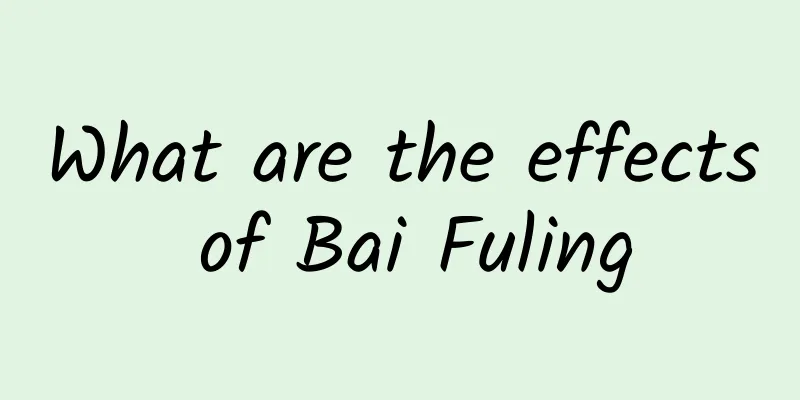What is the medicinal value of white ginseng?

|
Ginseng is a very important and precious medicinal material. Many people use ginseng to supplement the body's resistance. In fact, many ginsengs other than red ginseng are collectively called white ginseng after processing. Because it tastes a bit bitter, many people still rarely consume it. However, Chinese medicine practitioners use white ginseng to prepare many Chinese medicines in clinical practice. So what is the medicinal value of white ginseng? Let me briefly introduce it below. Improve the body's adaptability Ginseng can change the body's reactivity. Similar to Acanthopanax senticosus and Schisandra chinensis, it has an "adaptogen"-like effect, which means it can enhance the body's ability to respond to various harmful stimuli. Since ginseng can enhance the body's resistance to harmful factors, it is of great significance in the treatment of many infectious diseases. Effects on the cardiovascular system a. Effect on heart function: Ginseng has the effect of first exciting and then inhibiting the hearts of many animals, with a small amount of excitement and a large amount of inhibition. Its effect on the heart is similar to that of cardiac glycosides and can enhance myocardial contractility. Large doses weaken contractility and slow the heart rate. b. Effect on myocardium: Ginseng has a protective effect on myocardium. Studies have shown that the mechanism of ginseng total saponins in preventing myocardial ischemia and reperfusion injury is to promote the myocardial production and release of prostaglandins, inhibit the production of thromboxane A2, and protect myocardial cells through anti-oxidant free radicals and anti-lipid peroxidation effects. c. Effect on blood vessels: Ginseng is generally considered to be a vasodilator, but there are also reports of small doses causing contraction, large doses causing dilation, or first contraction followed by dilation. The effect of ginseng on blood vessels varies depending on the type of blood vessels or the state of the body. Some people believe that ginseng's different regulatory effects on blood vessels of different types and under different physiological conditions may be the reason why ginseng can regulate blood pressure in both directions. d. Effect on blood pressure: Most data show that ginseng can lower blood pressure in animals under normal or hypertensive conditions, but there are also reports of ginseng increasing blood pressure. Ginseng increases blood pressure in anesthetized animals in small doses, while large doses reduce blood pressure. The therapeutic dose has no significant effect on the patient's blood pressure. The pressor effect of ginseng may be related to the reduction in the size of the kidneys and spleen and the constriction of visceral blood vessels. It is worth noting that intravenous injection of ginseng extract can revive cats from a near-death state whose breathing has stopped, blood pressure has dropped, and reflexes have completely disappeared. e. Effect on hypoxia tolerance: Ginseng or its extracts can significantly improve animals' hypoxia tolerance, slow down oxygen consumption, prolong survival time, and extend the contraction time of the atrium under hypoxic conditions. Red ginseng's ability to improve tolerance to hypoxia is stronger than that of raw sun-dried ginseng. Ginseng total saponins can prevent anaerobic glycolysis and promote glycogen synthesis in oxygen- and sugar-deprived cardiomyocytes, thus playing a protective role in oxygen- and sugar-deprived cardiomyocytes. f. Effect on hematopoietic function: Ginseng or its extracts have a protective and stimulating effect on the hematopoietic function of the bone marrow, and can increase the number of red blood cells, white blood cells and hemoglobin in normal and anemic animals. It can also increase the red blood cell count, hemoglobin and platelets in patients with anemia. g. Effect on platelet function: Ginseng has the effect of inhibiting platelet aggregation. h. Lipid-lowering and anti-atherosclerotic effects: Ginseng, especially ginsenoside Rb2, can improve blood lipids, lower blood cholesterol and triglycerides, increase serum high-density lipoprotein cholesterol, and reduce the arteriosclerosis index. It has therapeutic value for hyperlipidemia, thrombosis and arteriosclerosis. Anti-shock effect For animals with acute circulatory failure due to hemorrhagic loss, ginseng can significantly increase cardiac amplitude and heart rate. In cases of heart failure, the cardiotonic effect is more significant. Effects on the liver Ginseng can increase the enzyme activity of the liver in metabolizing various substances, enhance the liver's detoxification ability, and thus enhance the body's tolerance to various chemicals. Effects on the endocrine system Effects on the pituitary gland and adrenal cortex: It is generally believed that ginseng itself does not have a corticosteroid effect, but some people have suggested that it can excite the adrenal cortex. Effects on metabolism Experiments have shown that ginseng has an inhibitory effect on normal blood sugar and hyperglycemia caused by injection of adrenaline and hypertonic glucose. Red ginseng can reduce the content of catecholamines, thereby limiting gluconeogenesis and leading to the regulation of sugar metabolism. Ginseng has a bidirectional regulatory effect on sugar metabolism. It can both lower blood sugar in glucose-induced hyperglycemia and increase blood sugar in insulin-induced hypoglycemia. Anti-tumor effect Ginsenosides in ginseng contain substances with anti-tumor effects. Ginsenoside rh2, ginsenoside rh1, ginsenoside rg3 and ginsenoside rg5 all have certain anti-tumor activity. Ginsenoside Rh2 is the ingredient in ginseng with the best anti-tumor effect. It is because white ginseng has many clinical medicinal uses. White ginseng can nourish yin and is very effective for people with lung heat. Some people use white ginseng to prolong their life. Ginseng is very valuable, but there are many different processing methods. Depending on the place of origin, the effects of ginseng processing are also different. In fact, some high-quality white ginseng can be soaked in boiling water and drunk. |
<<: What are the taboos of white peony?
>>: What are the medicinal values of white lotus
Recommend
The efficacy and function of southern yew
Taxus chinensis is a familiar medicinal material ...
94.1% of people have experienced “forgetting words when writing”, and now we finally know the reason!
How long has it been since you last wrote with a ...
The ears can not only hear sounds, but also "hear" these diseases in your body...
Three days ago, 51-year-old Mr. Li suddenly devel...
The efficacy and function of bitter white wax
Fraxinus chinensis is a famous traditional and co...
Difference Between Psyllium and Plantain
Salt plantain seeds and plantain are of the same ...
The longest train in China runs every 12 minutes on average.
Have you seen the longest train in China? Count t...
Acorus calamus poisoning experience
Acorus calamus is a very good Chinese herbal medi...
China Chenghuang Temple viewing guide! Who is silently guarding your hometown?
*At the end of the article, there is a recommende...
A man's action caused more than 30 cars to burn! Be careful recently
As the weather warms up The unbearable "flyi...
What are the effects of vinegar-soaked wolfberry?
Vinegar and wolfberry are two very common foods i...
Using "disposable shower cap" to cover dishes, is this kind of plastic wrap really usable?
In our home life, we use plastic wrap almost ever...
The efficacy and function of Jiuguniu
The essence of traditional Chinese medicine is to...
Chinese medicine Codonopsis pilosula properties and benefits
I have always been in poor health. What are the m...
The efficacy, function and consumption method of Sichuan Cyathula
Sichuan Achyranthes bidentata is a herb with medi...
The "Money Tree" Really Exists! Learn the Growth Secrets of This 1,800-Year-Old "Sacred Tree"
Guo Kai Liu Yujiao Speaking of money trees, you m...









